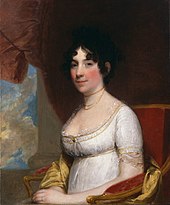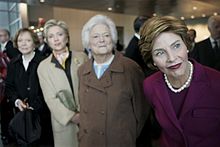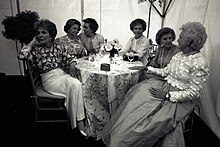First Lady of the United States
| First Lady of the United States | |
|---|---|
| Style | Madam First Lady |
| Abbreviation | FLOTUS |
| Residence | White House |
| Inaugural holder | Martha Washington |
| Formation | April 30, 1789 |
| Website | whitehouse.gov |
First Lady of the United States (FLOTUS) is the title held by the hostess of the White House, usually the wife of the president of the United States, concurrent with the president's term in office. Although the first lady's role has never been codified or officially defined, she figures prominently in the political and social life of the United States.[1] Since the early 20th century, the first lady has been assisted by official staff, known as the Office of the First Lady and headquartered in the East Wing of the White House.
Jill Biden has served as the first lady of the United States since 2021, as the wife of the 46th president, Joe Biden.
While the title was not in general use until much later, Martha Washington, the wife of George Washington, the first U.S. president (1789–1797), is considered to be the inaugural first lady of the United States. During her lifetime, she was often referred to as "Lady Washington".[2]
Since the 1900s, the role of first lady has changed considerably. It has come to include involvement in political campaigns, management of the White House, championship of social causes, and representation of the president at official and ceremonial occasions.
Additionally, over the years individual first ladies have held influence in a range of sectors, from fashion to public opinion on policy, as well as advocacy for
Origins of the title

The use of the title

According to popular belief, Dolley Madison was referred to as first lady in 1849 at her funeral in a eulogy delivered by President Zachary Taylor; however, no written record of this eulogy exists, nor did any of the newspapers of her day refer to her by that title.[5] Sometime after 1849, the title began being used in Washington, D.C., social circles. The first person to have the title applied to her while she was actually holding the office was Harriet Lane, the niece of James Buchanan; Leslie's Illustrated Newspaper used the phrase to describe her in an 1860 article about her duties as White House hostess. Another of the earliest known written examples comes from a November 3, 1863, diary entry of William Howard Russell, in which he referred to gossip about "the First Lady in the Land", referring to Mary Todd Lincoln. The title first gained nationwide recognition in 1877, when newspaper journalist Mary C. Ames referred to Lucy Webb Hayes as "the First Lady of the Land" while reporting on the inauguration of Rutherford B. Hayes. The frequent reporting on Lucy Hayes' activities helped spread use of the title outside Washington. A popular 1911 comedic play about Dolley Madison by playwright Charles Nirdlinger, titled The First Lady in the Land, popularized the title further. By the 1930s, it was in wide use. Use of the title later spread from the United States to other nations.
When Edith Wilson took control of her husband's schedule in 1919 after he had a debilitating stroke, one Republican senator labeled her "the Presidentress who had fulfilled the dream of the suffragettes by changing her title from First Lady to Acting First Man".[6]
According to the
Non-spouses in the role
Several women (at least thirteen) who were not presidents' wives have served as first lady, as when the president was a bachelor or widower, or when the wife of the president was unable to fulfill the duties of the first lady herself. In these cases, the position has been filled by a female relative of the president, such as Jefferson's daughter Martha Jefferson Randolph, Jackson's daughter-in-law Sarah Yorke Jackson and his wife's niece Emily Donelson, Taylor's daughter Mary Elizabeth Bliss, Benjamin Harrison's daughter Mary Harrison McKee, Buchanan's niece Harriet Lane, and Cleveland's sister Rose Cleveland.
Potential male title
Each of the 45[A] presidents of the United States have been male, and all have either had their wives, or a female hostess, assume the role of first lady. Thus, a male equivalent of the title of first lady has never been needed. However, in 2016, as Hillary Clinton became the first woman to win a major party's presidential nomination, questions were raised as to what her husband Bill would be titled if she were to win the presidency. During the campaign, the title of First Gentleman of the United States was most frequently suggested for Bill Clinton, although as a former president himself, he might have been called "Mr. President".[10] In addition, state governors' male spouses are typically called the First Gentleman of their respective state (for example, Michael Haley was the first gentleman of South Carolina while his wife, Nikki, served as governor).[11] Ultimately, Hillary Clinton lost the election, rendering this a moot point.
In 2021,
Role

The position of the first lady is not an elected one and carries only ceremonial duties. Nonetheless, first ladies have held a highly visible position in American society.[13] The role of the first lady has evolved over the centuries. She is, first and foremost, the hostess of the White House.[13] She organizes and attends official ceremonies and functions of state either along with, or in place of, the president. Lisa Burns identifies four successive main themes of the first ladyship: as public woman (1900–1929); as political celebrity (1932–1961); as political activist (1964–1977); and as political interloper (1980–2001).[14]
Martha Washington created the role and hosted many affairs of state at the national capital (New York and Philadelphia). This socializing became known as the Republican Court and provided elite women with opportunities to play backstage political roles.[15] Both Martha Washington and Abigail Adams were treated as if they were "ladies" of the British royal court.[13]

Many first ladies became significant fashion trendsetters.[13] Some have exercised a degree of political influence by virtue of being an important adviser to the president.[13]
Over the course of the 20th century, it became increasingly common for first ladies to select specific causes to promote, usually ones that are not politically divisive. It is common for the first lady to hire a staff to support these activities. Lady Bird Johnson pioneered environmental protection and beautification.[18] Pat Nixon encouraged volunteerism and traveled extensively abroad; Betty Ford supported women's rights; Rosalynn Carter aided those with mental disabilities; Nancy Reagan founded the Just Say No drug awareness campaign; Barbara Bush promoted literacy; Hillary Clinton sought to reform the healthcare system in the U.S.; Laura Bush supported women's rights groups, and encouraged childhood literacy.[13] Michelle Obama became identified with supporting military families and tackling childhood obesity;[19] and Melania Trump used her position to help children, including prevention of cyberbullying and support for those whose lives are affected by drugs.[20]
Since 1964, the incumbent and all living former first ladies are honorary members of the board of trustees of the National Cultural Center, the John F. Kennedy Center for the Performing Arts.[21]
Near the end of her husband's presidency, Hillary Clinton became the first first lady to seek political office, when she ran for United States Senate. During the campaign, her daughter Chelsea took over much of the first lady's role. Victorious, Clinton served as junior senator from New York from 2001 to 2009, when she resigned to become President Obama's secretary of state. Later, she was the Democratic Party nominee for president in the 2016 election, but lost to Donald Trump.
Office of the First Lady

The Office of the First Lady of the United States is accountable to the first lady for her to carry out her duties as hostess of the White House, and is also in charge of all social and ceremonial events of the White House. The first lady has her own staff that includes a chief of staff, press secretary, White House Social Secretary, and Chief Floral Designer. The Office of the First Lady is an entity of the White House Office, a branch of the Executive Office of the President.[22] When First Lady Hillary Clinton decided to pursue a run for Senator of New York, she set aside her duties as first lady[23] and moved to Chappaqua, New York, to establish state residency.[24] She resumed her duties as first lady after winning her senatorial campaign,[25] and retained her duties as both first lady and a U.S. senator for the seventeen-day overlap before Bill Clinton's term came to an end.[26]
Exhibitions and collections
Established in 1912, the First Ladies Collection has been one of the most popular attractions at the Smithsonian Institution. The original exhibition opened in 1914 and was one of the first at the Smithsonian to prominently feature women. Originally focused largely on fashion, the exhibition now delves deeper into the contributions of first ladies to the presidency and American society. In 2008, "First Ladies at the Smithsonian" opened at the National Museum of American History as part of its reopening year celebration. That exhibition served as a bridge to the museum's expanded exhibition on first ladies' history that opened on November 19, 2011. "The First Ladies" explores the unofficial but important position of first lady and the ways that different women have shaped the role to make their own contributions to the presidential administrations and the nation. The exhibition features 26 dresses and more than 160 other objects, ranging from those of Martha Washington to Michelle Obama, and includes White House china, personal possessions and other objects from the Smithsonian's unique collection of first ladies' materials.[27]

Fashion influence
Some first ladies have garnered attention for their dress and style.
Causes and initiatives

Since the 1920s, many first ladies have become public speakers, adopting specific causes.[32] It also became common for the First Lady to hire a staff to support her agenda. Recent causes of the First Lady are:
- civil rights, and humanitarian efforts
- Jacqueline Kennedy; White House restoration and the Arts
- Lady Bird Johnson; Environmental protection and Beautification
- Pat Nixon; Volunteerism
- Betty Ford; Women's rights, Substance abuse
- Rosalynn Carter; Mental health
- Nancy Reagan; "Just Say No", drug awareness
- Barbara Bush; Childhood literacy
- Healthcarein the United States
- Laura Bush; Childhood literacy
- Michelle Obama; "Let's Move!"; reducing childhood obesity
- Michelle Obama; "Let Girls Learn"; increasing education for girls
- Melania Trump; "Be Best"; cyberbullying awareness
- Jill Biden; "Joining Forces"; military families
See also
- First Ladies: Influence & Image
- First Ladies National Historic Site (Canton, Ohio)
- First Spouse $1 Coin Program
- List of current United States first spouses
- Second ladies and gentlemen of the United States
- Lewis L. Gould, pioneer scholar on First Ladies
- Sally Hemings
- Dolly Johnson
Notes
- ^ Grover Cleveland served two non-consecutive terms, so he is counted twice, as both the 22nd and 24th president.[9] Here, "presidents" refers to the 45 men who have held the office and not the 46 presidencies that have been held.
References
- ^ Caroli, Betty Boyd. "First Lady: United States title". Encyclopædia Britannica. Archived from the original on May 15, 2019. Retrieved September 30, 2016.
- ISBN 978-0-8368-5162-5. Archivedfrom the original on March 28, 2023. Retrieved October 1, 2016.
- ^ Mitchell, Zoe (March 10, 2021). "Does the First Lady Position Put Ladies First?". Australian Institute of International Affairs. Archived from the original on May 9, 2021. Retrieved April 3, 2022.
- ^ "Martha Washington". St. Johnsbury Caledonian. August 7, 1838. p. 1.
- ^ "First Lady Biography: Dolley Madison". National First Ladies' Library. Archived from the original on September 15, 2019. Retrieved March 1, 2007.
- ISBN 9780874835762. Archivedfrom the original on March 28, 2023. Retrieved June 16, 2015.
- Safire, William (October 12, 1997). "On Language; Potus And Flotus". The New York Times. Archived from the originalon September 9, 2018.
- ^ "FLOTUS" Archived January 14, 2021, at the Wayback Machine. Merriam-Webster. Retrieved January 28, 2020.
- ^ "Grover Cleveland—24". White House..
- ^ "US election: What will Bill Clinton's title be if Hillary wins the presidency?". BBC News. October 29, 2016. Archived from the original on May 15, 2021. Retrieved May 15, 2021.
- ^ THOMPSON, KRISSAH. "What happens when a man takes over role of first lady?". delawareonline.com. Archived from the original on May 15, 2021. Retrieved May 15, 2021.
- ^ "Poised To Be America's 1st Second Gentleman, Doug Emhoff Shakes Up Gender Stereotypes". NPR. National Public Radio. November 25, 2020. Archived from the original on November 30, 2021. Retrieved May 15, 2021.
- ^ a b c d e f g Anthony, Carl Sferrazza (September 26, 2008). "The Role of the First Lady". America.gov. Archived from the original on May 10, 2009. Retrieved May 4, 2009.
- ISBN 978-0-87580-391-3.
- from the original on October 10, 2018. Retrieved July 24, 2016.
- ^ O'Farrell, Brigid (2010). She was one of us: Eleanor Roosevelt and the American worker. Ithaca, NY: Cornell University Press.[page needed]
- ^ Troy, Gil (2001). "Jacqueline Kennedy's White House renovations". White House Studies. 1 (3): 395–404.
- ^ Gould, Lewis L. (1988). Lady Bird Johnson and the environment. University Press of Kansas.[full citation needed]
- National Archives.
- ^ Superville, Darlene (October 9, 2017). "Melania Trump Filling Out Her Agenda as First Lady". U.S. News & World Report. Associated Press. Archived from the original on January 14, 2021. Retrieved November 8, 2017.
- ^ "The Kennedy Center: Board of Trustees". Archived from the original on August 14, 2011. Retrieved November 4, 2014.
- National Archives.
- ^ "Hillary Clinton Makes a Historic Move". The Washington Post. Archived from the original on January 14, 2021. Retrieved August 27, 2017.
- ^ "Mrs. Clinton to Be Official New Yorker". The New York Times. November 24, 1999. Archived from the original on January 14, 2021. Retrieved February 19, 2017.
- ^ "The Race Won, the Senator-Elect Resumes Her First Lady Duties at the White House". The New York Times. November 10, 2000. Archived from the original on January 14, 2021. Retrieved February 19, 2017.
- ^ "A Day of Firsts As Mrs. Clinton Takes the Oath". The New York Times. January 4, 2001. Archived from the original on January 14, 2021. Retrieved February 19, 2017.
- ^ "The First Ladies". National Museum of American History, Smithsonian Institution. Archived from the original on August 19, 2012. Retrieved April 4, 2012.
- ^ "World's Best Dressed Women". The International Hall of Fame: Women. Vanity Fair. 1965. Archived from the original on July 12, 2013. Retrieved February 15, 2012.
- ISBN 2-84323-513-8.
- ISBN 9781118732182.
- ^ Givhan, Robin (2012). "First Lady Fashion Fatigue". The Daily Beast. Archived from the original on January 18, 2017. Retrieved October 30, 2014.
- S2CID 144913911.
Further reading
- Abrams, Jeanne E. . First Ladies of the Republic: Martha Washington, Abigail Adams, Dolley Madison, and the Creation of an Iconic American Role. New York New York University Press, 2018. ISBN 978-1-4798-8653-1.
- Anthony, Carl Sferrazza (1992). First Ladies: The Saga of the Presidents Wives and Their Power 1789–1961. New York: Quill/William Morrow.
- Bailey, Tim (Spring 2013). "America's First Ladies on Twentieth-Century Issues: A Common Core Unit". History Now. 35.[dead link] Curriculum unit based on primary sources.
- Berkin, Carol, ed. (Spring 2013). "America's First Ladies". History Now. 35. Archived from the original on March 18, 2013. Retrieved March 22, 2013. Popular essays by scholars.
- Böck, Magdalena (2009). The Role of First Ladies: A Comparison Between the US and Europe (eBook ed.). Munich: GRIN Verlag. ISBN 978-3-640-42153-4.
- Brower, Kate Andersen (2016). First Women: The Grace and Power of America's Modern First Ladies. New York: Harper. ISBN 978-0-06-243965-9.
- Caroli, Betty Boyd. "The Role of First Lady" in Graff, Henry F., ed. The presidents: A Reference History (3rd ed. 2002)
- Deppisch, Ludwig M. (2015). The Health of the First Ladies: Medical Histories from Martha Washington to Michelle Obama. McFarland.
- Gould, Lewis L. "First Lady as Catalyst: Lady Bird Johnson and Highway Beautification in the 1960s". Environmental Review 10.2 (1986): 77–92. online Archived September 20, 2022, at the Wayback Machine
- Gould, Lewis L. Lady Bird Johnson and the Environment (UP Kansas, 1988) online Archived September 27, 2022, at the Wayback Machine
- Gould, Lewis L. Helen Taft: Our Musical First Lady (UP Kansas, 2010).
- Gould, Lewis L. Edith Kermit Roosevelt: Creating the Modern First Lady (2012) online Archived September 27, 2022, at the Wayback Machine
- Hummer, Jill Abraham. First Ladies and American Women: In Politics and at Home (UP of Kansas, 2017); 269 pages;
- Lugo-Lugo, Carmen R. & Bloodsworth-Lugo, Mary K. (2011). "Bare Biceps and American (In) Security: Post-9/11 Constructions of Safe(ty), Threat, and the First Black First Lady". Women's Studies Quarterly. 39 (1): 200–217. S2CID 85344609. On media images of Michelle Obama.
- Pastan, Amy (2008). First Ladies. London: DK. ISBN 978-0-7894-7398-1. Heavily illustrated.
- Roberts, John B. (2004). Rating The First Ladies: The Women Who Influenced the Presidency (2nd ed.). New York: Citadel Press.
- Schwartz, Marie Jenkins. Ties That Bound: Founding First Ladies and Slaves (U of Chicago Press, 2017), 420 pp.
- Troy, Gil (1997). Affairs of State The Rise and Rejection of the Presidential Couple Since World War II. Free Press. ISBN 9780684828206. By a leading political historian.
- Truman, Margaret (1996). First Ladies: An Intimate Group Portrait of White House Wives. New York: Facett Columbine.
- Watson, Robert P. (2003). "Toward the Study of the First Lady: The State of Scholarship". Presidential Studies Quarterly. 33 (2): 423–441. .

